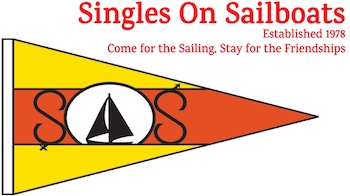|
Experience Levels:
SOS welcomes all levels of sailing experience. The following guidelines are provided to assist you in determining the self-assessed skill level under which you fall for completing the Membership form. Low Experience: Sailed occasionally (10-30 days) over the past five years, as either crew or passenger. Reasonable knowledge of sailing terminology; boat safety procedures; line handling during rafting and docking; tying bowline, figure eight and clove hitch; and cleating a line. Knowledge of basic navigation, man-overboard procedures, raising and lowering sails, sail trim and steering. Have knowledge of proper clothing, personal items, provisioning, and cooking required for day and weekend sails during spring, summer and fall. Moderate Experience: Low experience knowledge, plus: Sailed between 25 and 100 days over the past five years as crew. Good knowledge of sailboat and sailing terminology; boat safety procedures; radio use; line handling during rafting, docking, and anchoring; tying of required knots and hitches with speed and ease. Can assist skipper and First Mate in all aspects of running boat, can steer under power and sail, raise and lower sails, and trim sails with some confidence and little supervision. Can navigate, and keep DR plot and estimate of location without assistance.Know the rules of the road.Know heavy weather sailing procedures, including reefing. Experienced Moderate experience knowledge, plus sailed more than 50 days over the past five years as crew, first mate (or skipper backup), or skipper. Able to handle all aspects of sailing with confidence and without supervision. Can handle boat under sail or power in tight areas, and can dock or raft.Can ably manage or instruct in raising and lowering sails, trimming sails, docking, rafting, and anchoring.Can navigate well, properly keep DR plot and estimate location, and able to solve more complex navigation problems (e.g., SOG and COG.) Understand the effects of tides, currents, and weather. Able to use electronic navigation instruments (i.e. GPS). Able to run inboard and outboard gasoline and diesel engines, diagnose problems, and make simple repairs.Good knowledge of boat mechanical and electrical systems. Able, with confidence, to manage crew in role of skipper, or single hand. |
